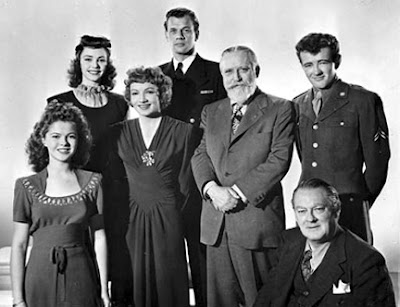"Beware of false prophets which come to you in sheep's clothing..."
Barbara Stanwyck stars in The Miracle Woman (1931) as Florence Fallon, the daughter of a preacher. Her father dies of heartbreak when his parish replaced him with a younger man. The disillusioned Florence lashes out at the parish. Witnessing this is con man Bob Hornsby (Sam Hardy). The delivery of her impassioned speech inspires him and he convinces her to use her talents to make a tidy profit. He proclaims, "religion is great if you can sell it, no good if you give it away." Bob transforms Florence into Sister Fallon, a radio evangelist whose religious messages make her a nationwide sensation. They put on elaborate shows at Fallon's tabernacle using trickery to fool the masses into believing she can perform miracles.
Everything goes to plan until John Carson (David Manners) comes into Florence's life. John is a former Air Force pilot gone blind. He spends his days in his apartment, composing music, practicing with his ventriloquist dummy and interacting with his landlady/helper Mrs. Higgins (Beryl Mercer). Depressed about his situation, he writes a suicide note and plans to jump out of the window. He hears Florence's radio broadcast and her words save him. John seeks out the woman who gave him a new lease on life. During one of Sister Fallon's tabernacle spectacles, John joins Florence on stage while they are both in a cage of lions. John doesn't realize Florence is a scam artist when he falls in love with her. As the two spend time together, Florence falls for John too. Florence starts to doubt herself, the people she's hurting and starts to imagine a different life. Will she be able to get out of her situation and keep John? And can she wrangle herself away from her manager Bob's stronghold?
 |
| Barbara Stanwyck and David Manners in The Miracle Woman (1931) |
The Miracle Woman (1931) is a Pre-Code film with a critical eye and a tender heart. It explores the dangers of using religion for greed and also what it means to see someone for who they truly are rather than what they pretend to be. Florence and John experience awakenings and rebirths as their stories progress. One could see this as a criticism of religion but I saw it as a warning against using faith for personal gain. I was enamored with the love story which is the heart and soul of the film.
Directed by Frank Capra for Columbia Studios, The Miracle Woman was based on John Meehan and Robert Riskin's play Bless You Sister and acquired by Harry Cohn. The story is loosely inspired by Aimee Semple McPherson, a Pentecostal evangelist famous in the 1920s and 1930s. The original play was a failure on Broadway. However Capra saw potential in the story especially after the success of George M. Cohan's The Miracle Man which was later adapted into a movie in 1919. Capra brought on Riskin to adapt the screenplay. Riskin was still traumatized by the failure of his Broadway production didn't think the story would work as a film. Capra then hired screenwriter Jo Swerling to take over. With a hat tip to The Miracle Man the title was changed to The Miracle Woman. Some details were changed including the name of the protagonist as well as the details involved with Florence meeting John Carson.
The movie was Capra's second of five collaborations with Barbara Stanwyck. David Manners was loaned out by First National for his part. He became famous for his role as John Harker in Dracula (1931). In later years he claimed to have never seen Dracula and asked that fans not send him copies of the film. Manners is absolutely charming in his role as John Carson. And it's clear that Capra was captivated with Stanwyck. The close-up shots and lighting of her character demonstrate the camera's attraction to its subject. Stanwyck and Manners would put in two very dangerous situations. This was in the days when the technology of movie making could only go so far. In the lion den scene Stanwyck and Manners were separated from the lions by an invisible net. During the film's climactic scene, both actors risked their lives as real flames shot up around them.
Unfortunately The Miracle Woman (1931) was a box office failure. With all of Capra and Swerling's good intentions not to make a movie that was anti-religion, audiences still didn't flock to the theaters for this one. The film was rejected by the British Board of Film Censors for its content and as a result never released theatrically in England. The box office failure had no effect on Barbara Stanwyck and Frank Capra's careers which were both on the rise.
The Miracle Woman (1931) is available on DVD through Sony Classics Choice Collection series. I recently watched the film on TCM. I highly recommend checking out Danny's excellent piece on the movie, completely with lots of visuals, over at Pre-Code.com.
Sources:
TCMDB
A Life of Barbara Stanwyck: Steel-True 1907-1940by Victoria Wilson















